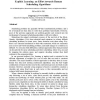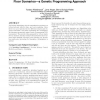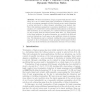626 search results - page 18 / 126 » Scheduling as Rule Composition |
CORR
2008
Springer
13 years 7 months ago
2008
Springer
Scheduling problems are generally NP-hard combinatorial problems, and a lot of research has been done to solve these problems heuristically. However, most of the previous approach...
GECCO
2010
Springer
13 years 9 months ago
2010
Springer
Developing dispatching rules for manufacturing systems is a tedious process, which is time- and cost-consuming. Since there is no good general rule for different scenarios and ob...
TACAS
2012
Springer
12 years 3 months ago
2012
Springer
Abstract. Automated verification of multi-threaded programs is difficult. Direct treatment of all possible thread interleavings by reasoning about the program globally is a prohib...
ICLP
2004
Springer
14 years 1 months ago
2004
Springer
Abstract. We study termination of logic programs with dynamic scheduling, as it can be realised using delay declarations. Following previous work, our minimum assumption is that de...
IJAR
2008
13 years 7 months ago
2008
The two most important models of inferencing in approximate reasoning with fuzzy sets are Zadeh's Compositional Rule of Inference (CRI) and Similarity Based Reasoning (SBR). ...



